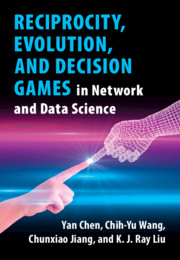Preface
Published online by Cambridge University Press: 01 July 2021
Summary
The motivation of this book and necessary background knowledge of this book are provided. First, a brief introduction to competition and cooperation in wireless and social networks is provided, along with examples and a literature review. Then, the limitations of traditional game theory in this area are presented. Finally, the three branches of modern game theory – indirect reciprocity, evolutionary games, and sequential decision-making – will be briefly mentioned to illustrate their strengths for overcoming the highlighted limitations.
Keywords
Information
- Type
- Chapter
- Information
- Publisher: Cambridge University PressPrint publication year: 2021
